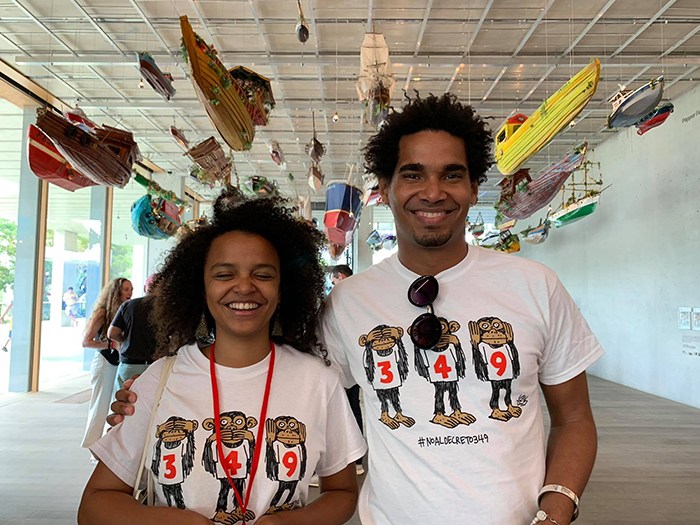[vc_row][vc_column][vc_column_text]

Yanelys Nuñez Leyva and Luis Manuel Otero Alcantara
Update: All arrested artists have now been released, although they remain under police surveillance. Cuba’s vice minister of culture Fernando Rojas has told the Associated Press that changes will be made to Decree 349 but has not opened dialogue with the artists involved in the campaign against the decree.
Cuban artists Luis Manuel Otero Alcantara and Yanelys Nuñez Leyva, members of the Index-award winning Museum of Dissidence, were arrested in Havana on 3 December for protesting against Decree 349, a law that will criminalise independent artists and places severe restrictions on cultural activity not authorised by the state. Their location was unknown until 4 December when it became clear they were taken to Vivac prison on the outskirts of Havana.
The performance artist Tania Bruguera was arrested separately, released and then rearrested. In all, 13 artists were arrested over 48 hours. Some have commenced a hunger and thirst strike.
There are reports of artists, including theatre actors, being unable to attend the protest due to a police presence at their homes. There are also reports of artists being threatened by state security with being thrown off buildings and with having their phones confiscated and broken.
Before his arrest, Otero Alcantara told Index: “349 is the image of censorship and repression of Cuban art and culture, and an example of the exercise of state control over its citizens.”
“Index on Censorship condemns the arrests of Luis Manuel Otero Alcantara, Yanelys Nuñez Leyva and Tania Bruguera, and demands their immediate and unconditional release,” says Jodie Ginsberg, CEO of Index on Censorship. “The arrests of those engaging in peaceful protest against a law that limits artistic freedom is completely unacceptable.”
Decree 349 will come into force on 7 December. Otero Alcantara visited London on 26 October where he protested in Trafalgar Square in flamboyant carnival attire as his character Miss Bienal against the draconian law. He told Index of his surprise at being allowed to demonstrate in a public area without interference from the authorities: “People stop and stare, you know, but police don’t arrest me. It is strange because this wouldn’t happen in Cuba.”
Otero Alcantara has been arrested on numerous occasions in Cuba, including in July for protesting Decree 349 outside the Ministry of Culture, and in August, along with Nuñez Leyva, for organising an anti-censorship concert.[/vc_column_text][/vc_column][/vc_row][vc_row][vc_column][vc_basic_grid post_type=”post” max_items=”4″ element_width=”6″ grid_id=”vc_gid:1551353027371-75b2196d-f44a-10″ taxonomies=”23772″][/vc_column][/vc_row]




